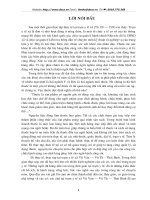TONG QUAN VE THUE QUOC TE
Bạn đang xem bản rút gọn của tài liệu. Xem và tải ngay bản đầy đủ của tài liệu tại đây (1.26 MB, 42 trang )
CHAP 1
INTRODUCTION TO
INTERNATIONAL TAXATION
LECTURER: Dang Thi Bach Van(MA)
1
Dang Thi Bach Van
5/9/18
CONTENT
Essential concepts in international taxation
Tax planning in multinational enterprises
Tax administration
Role of supranational organizations
Cross-border enforcement of taxes
BEPS project
2
Dang Thi Bach Van
5/9/18
Questions
Think about tax in the context of a single
jurisdiction tax in a global context.
Is there any international “ tax system”?
3
Dang Thi Bach Van
5/9/18
INTRODUCTION
Increasing integration
MNEs – cross border transactions >< international tax
issues
Foreign investment national goverments tax revenue
CONCEPTS
International taxation refers to tax levied on the cross
border transactions. The transactions may take place
between two or more persons or entities in two or more
countries or tax jurisdictions.
Such a transaction may involve a person in one country
with property and income flows in another
INTERNATIONAL TAXATION DEFINE
International tax refers to the international aspects of the
income tax laws of particular countries.
Các nguyên tắc đánh thuế áp dụng cho những giao
dịch giữa hai hoặc nhiều quốc gia.
Thuế luôn mang tính chất quốc gia, không mang tính quốc tế.
Không có tòa án thuế quốc tế hoặc các cơ quan quản lý các
vấn đề riêng về thuế quốc tế.
6
Questions
What determines the right of a country to
levy tax on a person or company?
What connection, if any, need there be
between taxpayer and the tax authority?
Most countries use the principles of source
and residence
7
Dang Thi Bach Van
5/9/18
Essential concepts
in international taxation
Home and Host Country
+ In Business Context:
Home Country refers to the country where
the headquarters is located.
Host Country refers to the foreign countries
where the company invests.
8
Dang Thi Bach Van
5/9/18
Essential concepts
in international taxation
Tax jurisdiction: the extent of a country’s
right to tax
Two principles
are therefore in common
use around the world to determine the
extent of a country’s tax jurisdiction:
RESIDENCE & SOURCE
9
Dang Thi Bach Van
5/9/18
Tax jurisdiction
Under
the resident jurisdiction: A
country may reserve the right to tax its
residents on their worldwide income and
gains.
Under the source jurisdiction: a country
reserves the right to tax not only the
worldwide income and gains of its tax
residents, but also the income and gains of
non-residents arising within its border.
10
Dang Thi Bach Van
5/9/18
Tax jurisdiction
A country’s tax base may therefore be defined in terms of:
The persons who are liable to pay tax (eg individuals only,
individuals plus corporations, individuals plus trustees plus
corporations, etc).
The types of income and capital on which tax must be paid.
For instance, a typical tax base might include:
Income taxes on earnings
Income taxes on investment income
Income/corporation taxes on profits of corporations
Capital taxes on capital profits
Capital taxes on inheritances
Indirect taxes on purchases of goods and services
Taxes on holdings of property and wealth
Tax base can be eroded through tax planning, tax avoidance
11
Dang Thi Bach Van
5/9/18
Federal systems and local-level
taxes
Some countries have multi-tier tax systems
where the federal government collects taxes
and the internal divisions of the country also
have their own tax systems.
Tax policy makers can learn much from the
operation of these sub-national tax systems.
Issues which the supra-national tax policy
makers grapple with, such as artificial shifting
of profits to low-level tax countries and which
country has the right to tax a particular
company have often been dealt with
successfully in state-level tax system.
12
Dang Thi Bach Van
5/9/18
Federal systems and local-level
taxes
In our study of double tax relief we are not usually
concerned with sub-national taxes because:
Sub-national taxes are normally tax deductible when
computing tax at the federal (national) level, thus any
potential double taxation to which they give rise has
already been dealt with;
Double taxation treaties (mainly bilateral agreements
under which two countries decide how double taxation
arising from the interface of their tax systems is to be
relieved) normally exclude sub-national taxes from
their provisions. In any case, double tax treaties
normally only deal with the taxation of income, gains
and capital, not sales or other indirect taxes.
13
Dang Thi Bach Van
5/9/18
Tax principles
in an international environment
How
should tax revenues be divided
between the various countries in which
taxpayers do business or otherwise earn
taxable profits?
what gives it jurisdiction to tax, residence
of a taxpayer or the source of the taxable
income or profits, or both?
14
Dang Thi Bach Van
5/9/18
Tax principles
in an international environment
A neutral tax is one which leaves a pre-tax
decision unchanged post tax, so that taxes
do not impinge on choices about savings
and investment
15
Dang Thi Bach Van
5/9/18
Tax principles
in an international environment
National neutrality (NN)
Capital export neutrality (CEN)
Capital import neutrality (CIN)
(Peggy Musgrave, 1960s)
16
Dang Thi Bach Van
5/9/18
Tax principles
in an international environment
National ownership neutrality (NON)
Capital ownership neutrality (CON)
(Desai and Hines, 2003)
17
Dang Thi Bach Van
5/9/18
Tax principles
in an international environment
National neutrality is insular, in that it
focuses on ensuring that the domestic
fiscal does not lose when residents invest
overseas.
It is concerned with equalising the after-tax
rate of return on foreign investments with
the pre-tax return on domestic investments
by treating foreign taxes paid in the same
way as other business expenses.
18
Dang Thi Bach Van
5/9/18
Tax principles
in an international environment
CEN is concerned with neutrality in the
location of investment.
Under this principle, a tax system should
be designed so that it is neutral regarding
outflows of capital, so that the total of
domestic and foreign taxes does not leave
a capital exporter worse off than if the
investment had all been in the home
country.
19
Dang Thi Bach Van
5/9/18
Tax principles
in an international environment
CIN is concerned with neutrality in the
source of investment and from a
government’s point of view means that
domestic companies should be protected
from a higher tax burden in a foreign
market than taxpayers from other countries
operating in that same market (ie all firms
of all nations pay the same rate of tax)
20
Dang Thi Bach Van
5/9/18
Tax principles
in an international environment
For CEN, it is the domestic tax rate that is
most important;
For CIN, it is the foreign tax rate.
21
Dang Thi Bach Van
5/9/18
Tax principles
in an international environment
National
ownership
neutrality
(NON)
suggests that the amount of tax paid by a
business should not depend on the identity,
or location, of its owners. Therefore,
decisions such as how to structure foreign
investment (eg as foreign direct investment
or otherwise), should not be influenced by
tax considerations.
22
Dang Thi Bach Van
5/9/18
Tax principles
in an international environment
Capital
ownership
neutrality
(CON)
suggests that tax systems should not
distort asset ownership on a worldwide
basis;
which
should
be
such
that
productivity is maximized.
NON and CON, in emphasising ownership
patterns, are based on a transaction cost
economics approach.
NON and CON highlight the distortion of
international ownership patterns leading to
inefficiencies.#
23
Dang Thi Bach Van
5/9/18
Tax planning in multinational
enterprises (MNEs)
MNEs usually:
consist of groups of companies or other
business entities which are resident in a
number of different countries, but which
are under common control;
Consist of partnership and other business
forms where the partners are resident in
different countries;
24
Dang Thi Bach Van
5/9/18
Tax planning in multinational
enterprises (MNEs)
MNEs usually:
Seek to exploit differences in the tax systems in
the various countries within which they operate
minimise the global tax bill, maximise global
after-tax profits.
May also seek to exploit differences not only in
the tax rates but also in the way tax profits
are computed – for example, by claiming a tax
deduction in one country for an item of
expenditure which is being paid to a fellow group
member in another country, whose tax system
does not count the receipt as taxable income.
25
Dang Thi Bach Van
5/9/18









